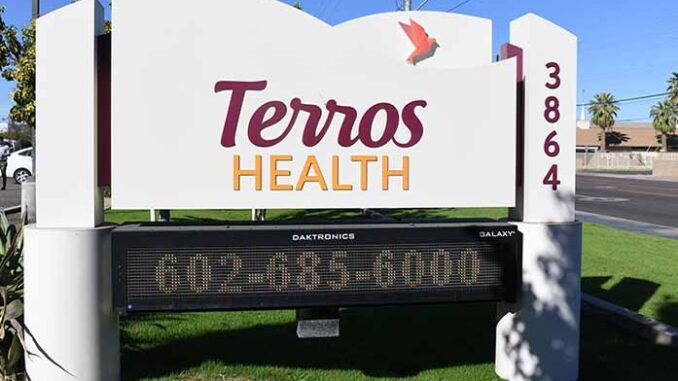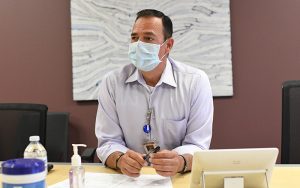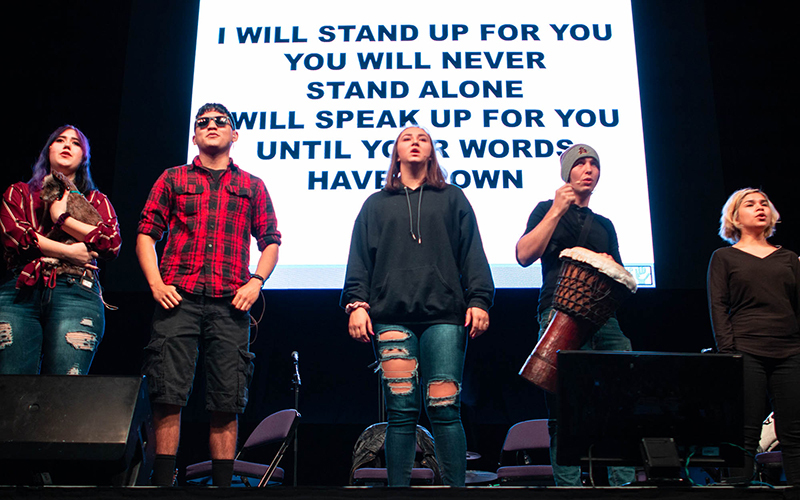
PHOENIX – A west Phoenix clinic is expanding treatment for mental health and substance use disorder for underserved individuals and veterans after securing a $4 million federal grant.
Terros Health was awarded the funds from the Substance Abuse and Mental Health Services Administration to improve access and care for complex mental health and substance use disorders.
The grant allows Terros to adopt what’s known as the Certified Community Behavioral Health Clinic model of care. The model focuses on “whole-person” care with a goal of improving coordination to get patients fast and thorough treatment through a single point of entry, instead of having to go through numerous specialists or agencies.
With the funding, Terros will increase screenings, provide different forms of outpatient care and improve rehabilitation services at its 27th Avenue clinic.
Ray Young, site director for the clinic, said the new services align with Terros’ objective of serving the medically underserved. The health care company operates 16 sites across metro Phoenix, including counseling centers, residential and day treatment facilities, and medical clinics.
“We do all possible to ensure that the clinics are strategically situated in geographical areas where the population is underserved,” Young said.

The grant also will allow Terros to provide mobile health services, care for patients in courts and jails, and improve veteran care through a partnership with the Department of Veteran Affairs. Terros plans to hire peers for veterans and specialists to help with housing and reentry into society.
Mental illness in the United States goes increasingly untreated, according to research from national nonprofit Mental Health America. Key findings from the group’s most recent report show that more than half of adults with a mental illness do not get treatment, even though suicidal ideation among adults has increased every year since 2011. And more than 2.5 million youth suffer from depression, with youth of color at higher risk.
Substance use also has been on the rise, federal statistics show, with overdose deaths hitting record highs amid the pandemic. New statistics from the Centers for Disease Control and Prevention show that overdose deaths over a 12-month span surpassed 100,000 for the first time in the U.S.
In a study earlier this year, researchers at the CDC found that although reports of certain mental health disorders and substance use disorders aren’t generally higher among racial or ethnic minority groups, these groups are less likely to receive treatment.
Systemic social inequities and discrimination can exacerbate that disparity. During the pandemic, for example, Hispanic adults reported a higher prevalence of stress from a lack of food or stable housing, the study found.
Young said that with the grant money, the 27th Avenue clinic will be able to expand housing education, employment assistance and reintegration services, such as coaching for job interviews.
“So let’s say somebody comes in and they’re homeless, and they come in for services but they don’t know how to apply for housing,” he said. “So through this grant, we now have a housing specialist.”
Young hopes the extra services will help reduce recidivism and hospitalizations, with a ripple effect that goes beyond individual patients served.
“It’s huge, and I think we sometimes forget the impact. We may be touching one individual patient, but that patient, then it touches their family, their extended loved ones, and that community. And it just grows and grows.”
Alongside recovery, wellness and trauma-informed care, the Certified Community Behavioral Health Clinic model emphasizes physical and behavioral health integration from screening and diagnosis through treatment planning and support services. More than 430 clinics are operating in 40 states. Terros joins two other such clinics in Arizona: Valle de Sol in Phoenix and Southeastern Arizona Behavioral Health Services in Benson.
In an October report, the National Council for Mental Wellbeing found that the model improved mental and physical care in various areas. The model increased the number of people served in several states and “enabled providers to hire and retain vital staff.”
Peggy Chase, president and CEO of Terros Health, said the company applied for the grant because of the increased need for holistic health care. The money will allow Terros counselors and physicians to improve treatment of the mind and body simultaneously.
“Even with something as simple as blood pressure: What’s going on? Is it a physical condition, or is it possibly anxiety and something that’s occurring within the mental condition?” she said.
Chase added that the money will allow Terros to build trust and address community-specific needs.
“They haven’t had generations of access to preventative medication and services. And so we really want them to trust us to build that rapport, and to change that paradigm,” she said.
And, ultimately, Chase hopes to expand this level of care beyond the 27th Avenue clinic.

